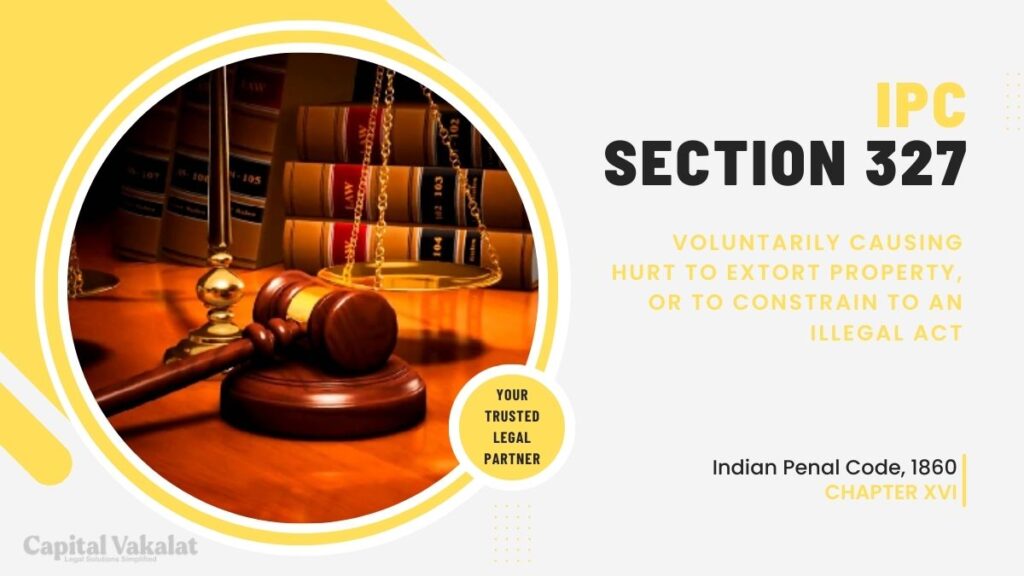In the vast expanse of the Indian Penal Code (IPC), Section 327 holds a distinctive position, addressing the grave offense of voluntarily causing hurt with the intention to extort property or constrain an individual to commit an illegal act.

This article delves into the intricacies of Section 327 IPC, unraveling its legal implications and exploring its historical evolution.
Understanding Voluntarily Causing Hurt
Before dissecting the specificities of Section 327, it is crucial to comprehend the term “voluntarily causing hurt.” In legal parlance, this refers to the intentional inflicting of physical pain or injury by one individual upon another. Section 327 encompasses various forms of hurt, each carrying its own set of legal consequences.
Extortion and Section 327 IPC
One of the key aspects covered by Section 327 is the offense of extortion. This involves the use of force or threat to compel another person to part with their property against their will. Real-life instances where Section 327 has been applied shed light on the severity of such actions and the protection the law provides to victims.
Constraining to an Illegal Act
Beyond extortion, Section 327 also addresses situations where the intent behind causing hurt is to constrain an individual to commit an illegal act. This broadens the scope of the section, encapsulating a range of scenarios where coercion is used for illicit purposes. Examining specific cases helps in understanding the diverse situations covered by this provision.
Historical Perspective of Section 327 IPC
To truly grasp the significance of Section 327, a journey into its historical evolution within the Indian Penal Code is essential. From its inception to subsequent amendments, the section has undergone changes reflecting the evolving legal landscape. Landmark cases have played a pivotal role in shaping the interpretation and application of Section 327.
Elements of the Offense
For a clearer understanding, it’s imperative to outline the elements that constitute the offense under Section 327. These elements serve as the building blocks for a successful prosecution, and understanding them is crucial for both legal professionals and the general public. The article breaks down these elements, providing insight into their legal implications.
Comparative Analysis with Other Sections
To avoid legal confusion, a comparative analysis of Section 327 with related sections in the IPC is warranted. By contrasting and clarifying distinctions, this section aims to simplify the intricate web of legal provisions, ensuring a comprehensive understanding of the specificities of Section 327 and its distinctiveness.
Controversies and Challenges
The legal landscape is seldom devoid of controversies, and Section 327 is no exception. This section explores the controversies surrounding the interpretation of Section 327, shedding light on legal challenges and debates that have arisen in recent times. Navigating through these controversies aids in comprehending the complexities of the section.
Role of Intent in Section 327 Cases
Intent plays a pivotal role in criminal cases, and Section 327 is no different. Establishing the intent behind causing hurt is crucial in proving guilt. This section examines the nuances of how the court determines intent in Section 327 cases, offering insights into the legal intricacies involved.
Impact on Society and Legal Reforms
Beyond the courtroom, the impact of Section 327 resonates in society. This section assesses the social implications of cases falling under Section 327 and explores potential legal reforms or amendments that could enhance the efficacy of the section in addressing evolving challenges.
Conclusion
In conclusion, Section 327 of the IPC stands as a formidable deterrent against those who would resort to violence for personal gain or to coerce others into illegal activities. Its historical evolution, legal intricacies, and impact on society all contribute to its significance within the framework of criminal law.
Frequently Asked Questions
How does the court establish the intent in Section 327 cases?
The court relies on evidence and contextual factors to establish the intent behind causing hurt, considering the circumstances surrounding the incident.
Are there ongoing debates about the interpretation of Section 327?
Yes, Section 327 has been a subject of legal debates, with ongoing discussions about its application in modern contexts and potential reforms.
What legal consequences can arise from violating Section 327?
Violating Section 327 can lead to serious legal consequences, including criminal charges and penalties. The severity depends on the nature and extent of the offense.